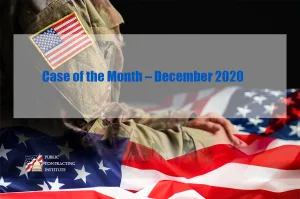PCI has started a new webinar series, the Case of the Month Club. Each month PCI’s Government Contracts law experts will discuss one or two recent cases. If you do not need credit for the session, join for free at this link, using the code: NoCreditFree
Here is a summary of both cases.

Bluewater Management Group, LLC v. United States
Court of Federal Claims
Issued November 16, 2020
Facts: The Department of Veteran’s Affairs (VA) issued a solicitation for lodging services. The solicitation set up a tier-system for consideration. Service Disabled Veteran Owned Small Businesses would be evaluated first, at tier one. If no award was made, then Veteran Owned Small Businesses would be considered, representing tier two. Following that, other small businesses would be considered at tier three, with a preference toward HUBZone offerors. The solicitation also indicated that discussions would be held in connection with the procurement.
The VA received offers at all tiers, and three at tier one. The VA excluded two tier one offerors as non-responsive. Then the VA established a competitive range that included only Brian Hall, the remaining tier one offeror. Brian Hall’s proposal received an technical rating of “unsatisfactory.” The VA then conducted discussions with Brian Hall.
The protestor, Bluewater Management Group (Bluewater), was a tier 3 offeror and was not a HUBZone contractor. Bluewater initially submitted a protest to the GAO, which dismissed the protest on the grounds that only interested parties have standing to file a protest. The GAO held that, even with a successful protest, Bluewater was extremely unlikely to receive the resulting contract, and therefore lacked standing. Even if the protest succeeded, there was a tier two offeror and a same-tier HUBZone offeror who would be considered ahead of Bluewater[1]. Bluewater then filed a protest at the Court of Federal Claims.
Issues: Bluewater made four arguments:
- The VA deviated from the evaluation scheme by conducting discussion with Brian Hall.
- The VA treated Brian Hall’s proposal more leniently than other SDVOSBs.
- The VA’s evaluation of Brian Hall’s proposal deviated from the solicitation’s evaluation scheme.
- The VA’s evaluation of Brian Hall’s performance risk was arbitrary and capricious.
Additionally, does Bluewater have standing?
Holding and Reasoning:
Bluewater has standing. Upon review, the court found that substantial weaknesses were possible with the tier two and HUBZone offerors, which meant that there was a decent chance that Bluewater would be considered for award if its protest was successful.
- The VA did not deviate from the solicitation’s evaluation scheme by conducting discussions with Brian Hall.
Bluewater claimed that the VA could not conduct discussions with Brian Hall when they submitted a deficient proposal. It is acceptable to use discussions to help cure an otherwise deficient proposal. Therefore, it was acceptable for the VA to conduct discussions with Bluewater, giving them a chance to cure their proposal.
- The VA treated Brian Hall’s proposal more leniently than other SDVOSBs.
Bluewater also claimed that the VA treated Brian Hall more leniently by not excluding Brian Hall when they excluded the other tier one offerors for submitting non-responsive offers. The court rejected this argument because Brian Hall’s proposal was only slightly deficient, whereas the two excluded offerors had dramatically non-compliant proposals. The other offers were functionally incomplete since they did not include required elements in their proposals. Brian Hall had submitted a complete offer that required improvements before the VA could accept the offer. Therefore, Brian Hall was not extended more leniency than the other tier one offerors.
- The VA’s evaluation of Brian Hall’s proposal deviated from the solicitation’s evaluation scheme.
Bluewater argued that the VA did not evaluate Brian Hall’s technical proposal according to the method described in the solicitation. The solicitation stated that safety and security would be evaluated at all hotels in the solicitation. Brian Hall’s proposal only spoke to safety and security at some of the hotels, but not others. However, the VA did not consider these missing elements when evaluating Brian Hall’s proposal. Since the VA did not evaluate Brian Hall’s proposal in accordance with the solicitation, the court sustained this protest argument.
- The VA’s evaluation of Brian Hall’s performance risk was not arbitrary and capricious, despite significant flaws.
Bluewater argued that the VA erroneously awarded Brian Hall a Low Risk performance risk rating. Brian Hall’s proposal contained several typos, and if the VA has followed up on Brian Hall’s claims, it would have appeared as if Brian Hall’s performance history was weaker than their proposal suggested. Additionally, the VA did not do extensive research into Brian Hall’s previous contracts prior to giving them their Low Risk rating.
However, arbitrary and capricious is a high standard. The court did not hear any evidence that Brian Hall deserved a rating other than Low Risk, and so they do not believe that the VA erroneously awarded Brian Hall their performance risk rating.
Outcome: The court enjoined the VA from continuing performance, directs them to cancel the contract with Brian Hall and to proceed with evaluating the tier 2 offerors.
[1] Comment from Editor FG: I can’t help but quote the old folk song lyric about a train being melted down to scrap in order to build a factory:
Blue Water, Blue Water, Blue Water Line
Blue Water, Blue Water, Blue Water Line
If you can’t afford a quarter then you ought to give a dime
If everybody gave then we could save the Blue Water Line
Appeal of: Alistiqama Co.
Armed Services Board of Contract Appeals
October 27, 2020
Facts: Alistiqama held a BPA with the Army under which the Army rented equipment for material handling equipment and line haul services at locations in Kuwait, Iraq, and Syria. The contract required the Army to return the rented equipment by a certain date. Upon contract completion, Alistiqama received final payment and released the Army from all claims and liabilities. Alistiqama signed the release, even though the Army had not yet returned certain equipment. The Army continued to use Alistiqama’s equipment for six months after the end of the contract. Other equipment had been returned prior to the release, but it was overdue by several weeks. Alistiqama had not claimed extra rental time for the late return prior to signing the release. Alistiqama was represented pro se in this case.
Alistiqama submitted a claim to the Armed Services Board of Contract Appeals for the additional rental time.
Issues: Does the release prevent Alistiqama from making a claim on their contract with the Army?
Was there a subsequent implied-in-fact contract that would allow them to receive payment despite having released their claims?
Holding and Reasoning: Alistiqama may not submit a claim after releasing the Army from liability, except in narrow situations: (1) mutual mistake where neither party intended to release a certain claim; (2) parties post-release conduct indicates that the parties did not intend to abandon their claim; (3) the release was an obvious mistake; (4) fraud or duress, or (5) the contracting officer knows that the contractor intends to submit a claim. No evidence was offered that these situations were present in this case, so the Board denied the claim.
Additionally, the board suggested that Alistiqama may have been able to argue a subsequent implied-in-fact contract with the Army. To prove this, they needed to offer evidence there was (1) mutuality of intent to contract; (2) consideration; (3) unambiguous offer and acceptance; and (4) actual authority on the part of the government representative whose conduct is relied upon. However, Alistiqama did not allege the facts necessary to support this avenue for relief.
Additional Information



